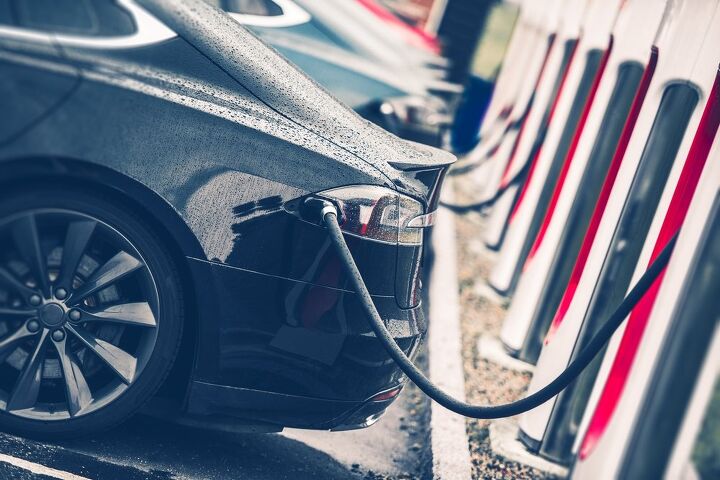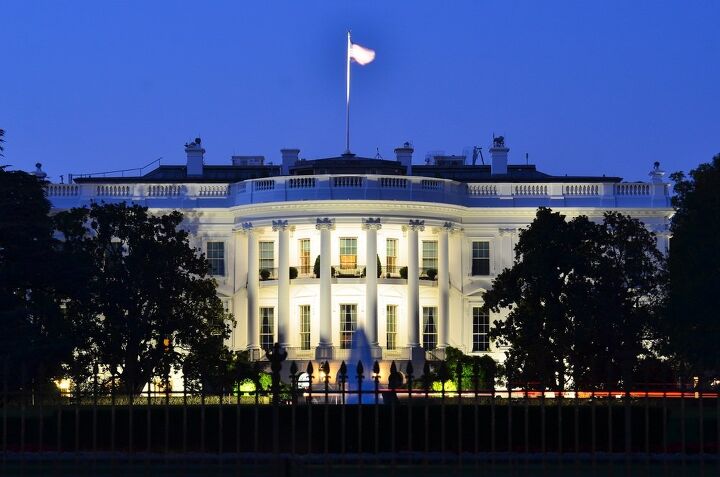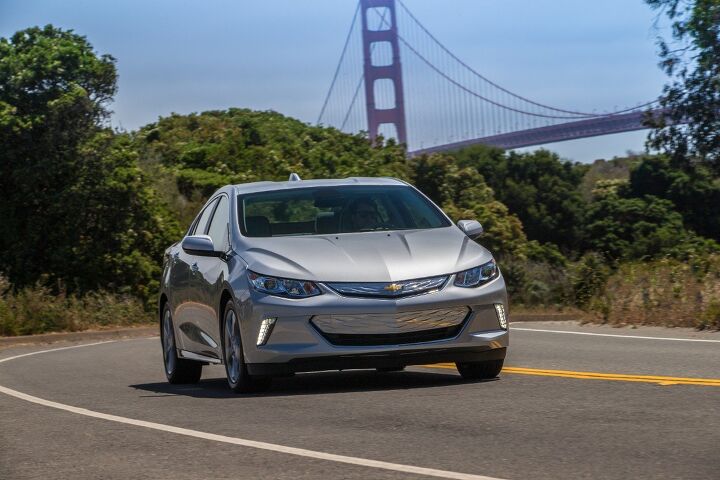#Congress
Congress Says Nay to Expanding EV Tax Credits
Prior to Congress taking the rest of the month off to relax and presumably gear up for an impeachment trial, they first had to settle their year-end tax package. Automakers were hoping that would include an extension of electric vehicle tax credits, but it was a doomed proposition.
An extension was initially included in the bipartisan Driving America Forward Act, which manifested this spring, before being incorporated into the Democrat-friendly GREEN Act (Growing Renewable Energy and Efficiency Now). That got it through the House but not the Republican-controlled Senate, which wasn’t interested.
While the current $7,500 EV tax credit remains in place, Tesla and General Motors have both reached their 200,000-vehicle quota. Naturally, they (and other automakers) lobbied for an expansion, one which would have seen a $7,000 credit kept in place until a manufacturer sold 600,000 electric automobiles. Several Republican lawmakers openly shared their distaste for the plan, though few more openly than Senator John Barrasso of Wyoming, who had an opposing bill — called the Fairness for Every Driver Act — interested in reducing subsidies on the grounds that EV credits have already done enough.
Trade War Watch: Report Claims White House Wants to Dictate Where Cars Are Manufactured
The Trump administration has reportedly expressed an interest in deciding where and how automotive manufacturers do their business if they want to secure duty-free deals under the United States–Mexico–Canada Agreement (USMCA) that’s positioned to replace NAFTA. According to Bloomberg, there’s currently a discussion taking place between administration officials, congressional staff, and domestic and foreign automakers regarding the context of the legislation that lawmakers will ultimately have to vote on. The White House is said to want highly specific language that would allow it to select production rules unilaterally.
Considering how messy things have gotten with China, it could be useful to have extremely clear trade language and some direct oversight of businesses with global interests. But critics are worried the strategy could bring U.S. trade policy closer to the rigid policies already in place in the People’s Republic — a country America has attempted to distance itself from due to its ludicrous levels of government intervention.
The real fear is that the government could use this to give one manufacturer better treatment than another — cutting it a sweet deal for building in a politically advantageous area, for example. While plausible, we can’t confirm something that’s largely speculative.
Senate Considers $454 Billion Swap to Nationwide Electrification
On Thursday, Senator Chuck Schumer (D-NY) proposed a $454 billion plan aimed at converting the United States from a gasoline-powered nation to one driven primarily by electricity. Under the 10-year plan, automotive consumers would get rebates ranging from $3,000 to over $5,000 (based on efficiency), plus another $2,000 for low-income buyers, for the purchase of electric vehicles made in America.
“This proposal to bring clean cars to all of America will be a key component of the far-reaching climate legislation from Senate Democrats, and I’m proud it has a broad coalition of support,” the senior senator said in a statement.
Much like the haphazard way Schumer insists on wearing glasses at the outermost tip of his nose, begging for gravity to take them, his plan has us mildly concerned.
Tapping Into Technology: Congress Considers Terrifying New Solutions for Drunk Driving
U.S. Senators Tom Udall (D-NM) and Rick Scott (R-FL) plan to introduce new legislation forcing automakers to install hardware that would effectively stop intoxicated individuals from operating motor vehicles by the middle of the next decade. The stated goal is to prevent the thousands of fatal crashes stemming from drunk driving each year. It’s similar to a bill introduced by House Representative Debbie Dingell (D-MI), which aims to have advanced DUI prevention devices in all cars by 2024.
While it’s difficult to get bent out of shape over any system that curtails drunk driving, we’ve managed to find a way. As usual, it plays into your author’s ever-growing phobia of surveillance-focused technologies.
Gas War Watch: EPA and CARB Leadership Won't Even Share the Same Table
Capitol Hill was the scene of some high-school drama this week after representatives from the Environmental Protection Agency (EPA) and the California Air Resources Board (CARB) reportedly refused to sit at the same table while discussing fueling regulations with the U.S. House Energy and Commerce Committee.
As petty as this seems, it illustrates the overall situation rather well. White House officials terminated talks with California in February, citing an inability to progress the debate. Meanwhile, CARB has been claiming the Trump administration doesn’t want to hear its case and has instead sought to strip the state of its ability to self regulate in order to pass reforms that would freeze national emissions standards at 2020 levels though 2026.
Thursday’s congressional bickering helped paint a clearer picture of what the communications breakdown looked like.
Gas War Watch: UAW Goes to Congress, Sides With Automakers on Fuel Economy Rollback
The United Auto Workers is spending Thursday telling Congress that the union opposes the Trump administration’s proposal to freeze fuel efficiency requirements at 2020 levels through 2026… sort of. While the UAW expressed moderate environmental concerns in the past, most of its opposition to the rollback has revolved around corporate investments into the industry. In fact, the union’s research arm called fuel economy the auto industry’s “future” in 2018.
This time around, the UAW seems to be singularly focused on business aspects. According to a prewritten testimony, UAW Legislative Director Josh Nassar intends to tell two subcommittees of the U.S. House Energy and Commerce Committee that the union is in line with automakers’ concerns about the proposal leading to “protracted litigation and uncertainty in the industry that will limit growth.”
Congress Considers Mandating Rear Seat Child Alerts
U.S. lawmakers are considering legislation that would require automakers to install technology on all new vehicles that would alert drivers to check for children before exiting a vehicle. If passed, the bill would require the National Highway Traffic Safety Administration to write new rules within two years mandating the introduction of “a distinct auditory and visual alert” to remind drivers to check the back seat. It also calls for a study to assess the feasibility of retrofitting older vehicles with the system.
Lawmakers claim that more than 800 U.S. children have died from heatstroke over the last two decades as a result of being left unattended inside an automobile.
Bipartisan Bill Hopes to Triple Number of EV Tax Credits
With many concerned that the public’s modest adoption of electric vehicles could backslide without a federal tax incentive, U.S. lawmakers introduced legislation on Wednesday to expand the EV tax credit by 400,000 vehicles per manufacturer.
This would help companies that have already exhausted their quota, like Tesla and General Motors, but even automakers that are nowhere near their current allowance would have something to gain — a wider window in which to sell alternative-energy vehicles with governmental help.
Called the “Driving America Forward Act,” the legislation would grant automakers a $7,000 tax credit for an additional 400,000 vehicles and shorten the depletion/phase-out schedule to nine months. However, the existing deal of 200,000 vehicles per automaker eligible for $7,500 tax credit would also remain intact, resulting in a pretty big allowance for government incentives.
The Green New Deal Is Unlikely to Change the Auto Industry Anytime Soon
If you’re freaked out that the so-called Green New Deal will soon render you carless, or perhaps driving an EV against your will, I am here to tell you: Relax.
If you’re hoping the Green New Deal will save the planet from a climate crisis the federal government itself has predicted is just a hair over a decade away, I am here to tell you: Those backing the deal have their hearts in the right place, but their heads in the clouds. Or perhaps somewhere lower and darker.
Trade War Watch: Congress Tries a New Tactic to Block Auto Tariffs
With the United States’ government shutdown now over, lawmakers have an opportunity to work together as promised. Interestingly, one of the first pieces of bipartisan legislation to emerge after the federal bureaucracy resumed operations involves a plan to severely limit presidential authority to impose tariffs for national security reasons.
The Bicameral Congressional Trade Authority Act, introduced by Senators Patrick Toomey (R-PA) and Mark Warner (D-VA), along with House Representatives Mike Gallagher (R-WI) and Ron Kind (D-WI), would require the president to get approval from Congress before taking any trade actions based on national security threats. If passed into law, the bill would let the Legislative Branch effectively block the tariffs being proposed by the Trump administration on automobiles and automotive parts.
Ohio Senators Want to Know GM's EV Plans, Demand American Production
Two senators in Ohio, home to the unfortunate Lordstown Assembly plant, want answers from General Motors. Following the automaker’s announcement that it will withdraw the plant’s sole product — the Chevrolet Cruze — in March of 2019, leaving the factory’s remaining 1,500 workers out of a job, politicians on both sides of the border want to know what GM’s plans for electric and autonomous mobility mean for their constituents.
If GM’s truly planning on springing a wave of electric vehicles on American buyers, Congress wants assurances that American workers will build them.
Damage Control: GM Attempts to Smooth Things Over in Washington
General Motors’ restructuring plan has placed it under heavy fire. As it turns out, domestic job cuts and factory closings aren’t all that popular on Capitol Hill or in middle America, especially when a company appears financially healthy. Go figure.
Hoping to mitigate the social damage that’s only guaranteed to escalate next year, GM CEO Mary Barra took a trip to Washington to speak for the automaker. However, there wasn’t much backpedalling or apology-making coming from the executive. Instead, Barra’s presence served only to show that the company is capable of listening while simultaneously reinforcing that there will be no changes made to the plan.
Midterm Elections Add Ticking Clock Element to Congress' Self-Driving Car Bill
It looks like Congress’ new self-driving bill might have to wait until a new batch of unmentionables plant their collective rear ends in the seats populating Capitol Hill. Already passed in the House, the SELF DRIVE Act has managed to garner bipartisan support — a true miracle in these troubled times.
However, it’ll have to spread wings if it wants to be signed into law before year’s end. The midterm elections could stymie everything and force Congress to start all over again. A likely prospect, considering the Senate is still going over the bill.
“This entire process has been an incredible feat of bipartisanship,” Greg Rogers, director of government affairs at Securing America’s Future Energy, told Bloomberg. “Attempting to recreate a bill that’s this ambitious and this significant would be like trying to catch lightning in a bottle all over again.”
Should Police Have the Ability to Track and Disable Self-driving Vehicles?
Autonomous vehicles have created an endless series of unanswerable questions. As the technology continues to advance, decisions on how best to implement it have not. We’ve yet to discern who is liable in the event of an accident, how insurance rules would change, if they can coexist effectively with traditional automobiles, how they will impact vehicle ownership in the long term, and the infrastructure necessary to ensure they’ll function as intended.
There’s also a myriad of security concerns involving everything from the very real prospect of vehicle hacking to automakers selling the personal information of drivers. Both of those topics are about to come to a head as automakers continue shifting toward connected vehicles.
In March, the U.S. Transportation Department met with auto industry leaders, consumer advocacy groups, labor unions, and others in an attempt to navigate the minefield that is autonomous integration. The department previously hosted similar roundtable discussions in December after releasing the new federal guidance for automated driving systems, called “ A Vision for Safety 2.0.” That guidance freed up automakers and tech firms to test self-driving vehicles with fewer regulatory hurdles to cope with.
However, the December report seemed to focus mainly on how little everyone outside the industry understands the new technology.
Are Government Officials Souring On Automotive Autonomy?
Thanks to the incredibly lax and voluntary guidelines outlined by the National Highway Traffic Safety Administration, automakers have had free rein to develop and test autonomous technology as they see fit. Meanwhile, the majority of states have seemed eager to welcome companies to their neck of the woods with a minimum of hassle. But things are beginning to change after a handful of high-profile accidents are forcing public officials to question whether the current approach to self-driving cars is the correct one.
The House of Representatives has already passed the SELF DRIVE Act. But it’s bipartisan companion piece, the AV START Act, has been hung up in the Senate for months now. The intent of the legislation is to remove potential barriers for autonomous development and fast track the implementation of self-driving technology. But a handful of legislators and consumer advocacy groups have claimed AV START doesn’t place a strong enough emphasis on safety and cyber security. Interesting, considering SELF DRIVE appeared to be less hard on manufacturers and passed with overwhelming support.
Of course, it also passed before the one-two punch of vehicular fatalities in California and Arizona from earlier this year. Now some policymakers are admitting they probably don’t understand the technology as they should and are becoming dubious that automakers can deliver on the multitude of promises being made. But the fact remains that some manner of legal framework needs to be established for autonomous vehicles, because it’s currently a bit of a confused free-for-all.





























Recent Comments